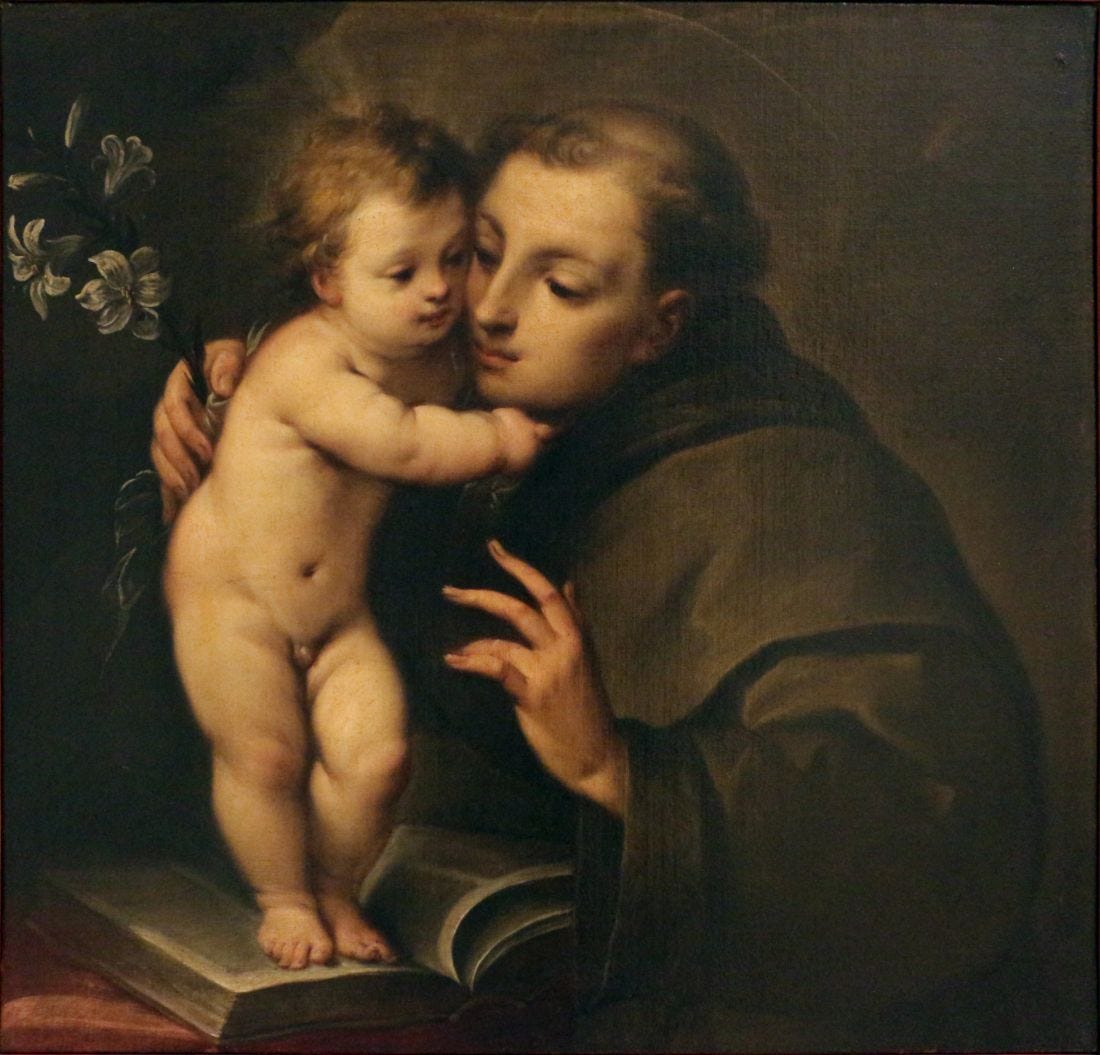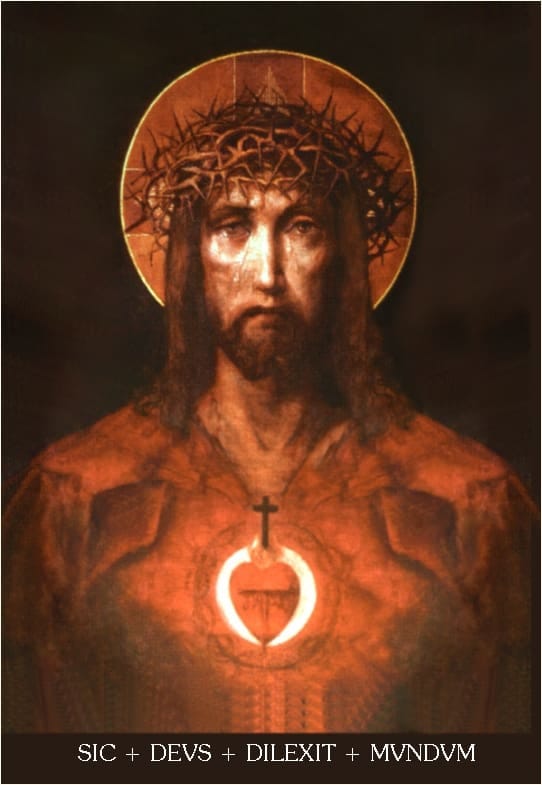“The Creator of the Heavens obeys a carpenter; the God of Eternal Glory listens to a poor virgin. Has anyone ever witnessed anything comparable to this? Let the philosopher no longer disdain from listening to the common laborer; the wise, to the simple; the educated, to the illiterate; a child of a prince, to a peasant.” -St. Anthony of Padua
Today we celebrate the Feast Day of St Anthony of Padua, Hammer of the Heretics and devoted to by millions of people around the world. Many of the Feast Day celebrations and Festivals in his honor have been going on for centuries and here in the United States for decades.
Litany of St. Anthony of Padua
Lord, have mercy on us.
Christ, have mercy on us.
Lord, have mercy on us.
Christ, hear us. Christ graciously hear us.
God, the Father of Heaven, have mercy on us.
God, the Son, Redeemer of the world, have mercy on us.
God, the Holy Ghost, have mercy on us.
Holy Trinity, one God, have mercy on us.
Holy Mary, pray for us.
Holy Mother of God, pray for us.
Holy Virgin of virgins, pray for us.
St. Joseph, spouse of Mary, pray for us.
St. Francis, patriarch of the poor, pray for us.
St. Anthony of Padua, pray for us.
St. Anthony, friend of Jesus and Mary, pray for us.
St. Anthony, apostolic man, pray for us.
St. Anthony, filled with the spirit of prophecy, pray for us.
St. Anthony, sublime doctor of truth, pray for us.
St. Anthony, ornament of the Seraphic Order, pray for us.
St. Anthony, light of Holy Church, pray for us.
St. Anthony, preacher of grace, pray for us.
St. Anthony, trumpet of the Gospel, pray for us.
St. Anthony, mirror of regular observance, pray for us.
St. Anthony, cultivator of a mortified life, pray for us.
St. Anthony, model of abstinence, pray for us.
St. Anthony, example of obedience, pray for us.
St. Anthony, example of poverty, pray for us.
St. Anthony, lily of chastity, pray for us.
St. Anthony, rose of patience, pray for us.
St. Anthony, gem of sanctity, pray for us.
St. Anthony, violet of humility, pray for us.
St. Anthony, hammer of heresy, pray for us.
St. Anthony, zealous for Divine worship, pray for us.
St. Anthony, thirsting for the salvation of souls, pray for us.
St. Anthony, martyr in desire, pray for us.
St. Anthony, lover and assiduous imitator of the Redeemer, pray for us.
St. Anthony, devout client of the Virgin Mother of God, pray for us.
St. Anthony, emulator of the Seraphic Francis, pray for us.
St. Anthony, worker of manifest miracles, pray for us.
St. Anthony, protector of those who hope in thee, pray for us.
Lamb of God, Who takest away the sins of the world, spare us, O Lord.
Lamb of God, Who takest away the sins of the world, graciously hear us, O Lord.
Lamb of God, Who takest away the sins of the world, have mercy on us, O Lord.
V. Blessed Anthony, powerful preacher, pray for us;
R. That by thy intercession we may enjoy life eternal.
Let us pray. Grant, O Lord, that Thy people, aided by the pious and continual supplication of Thy illustrious confessor, blessed Anthony, may be made worthy of Thy grace in this world, and attain happiness in the next. Through Jesus Christ Our Lord. Amen.1
The blessing and distribution of Blessed bread before the St. Anthony procession in Melrose Park (Chicago)
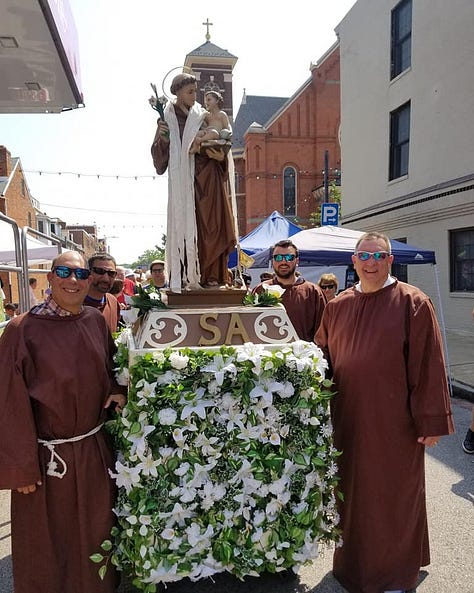
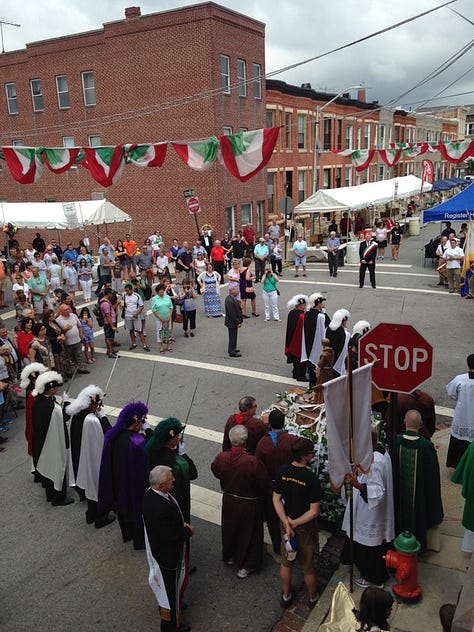

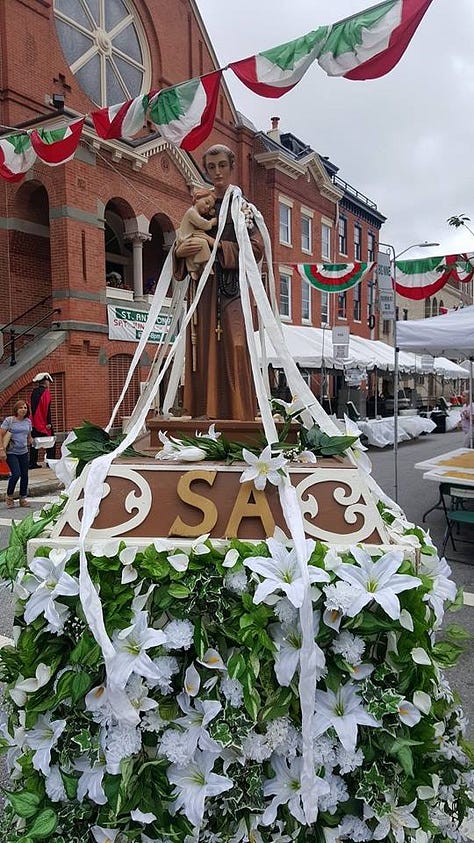

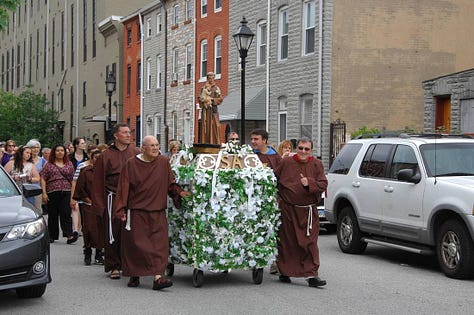

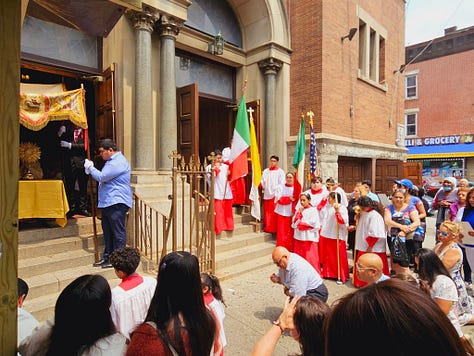


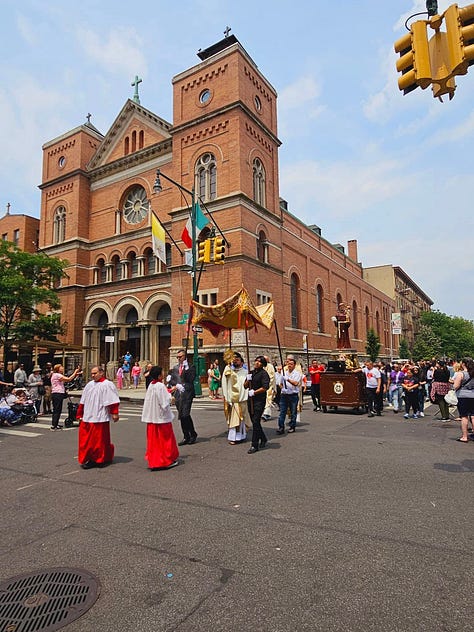


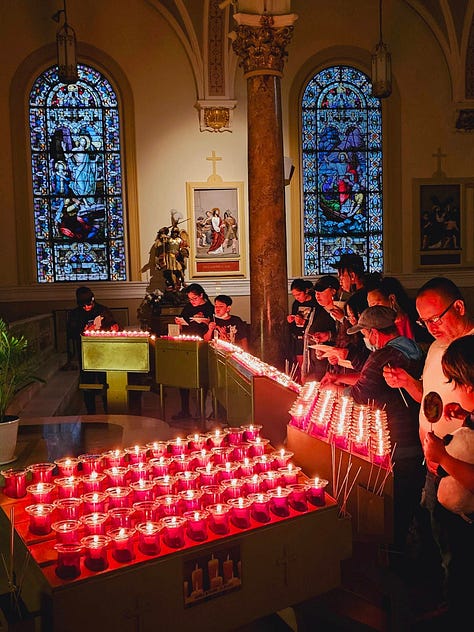
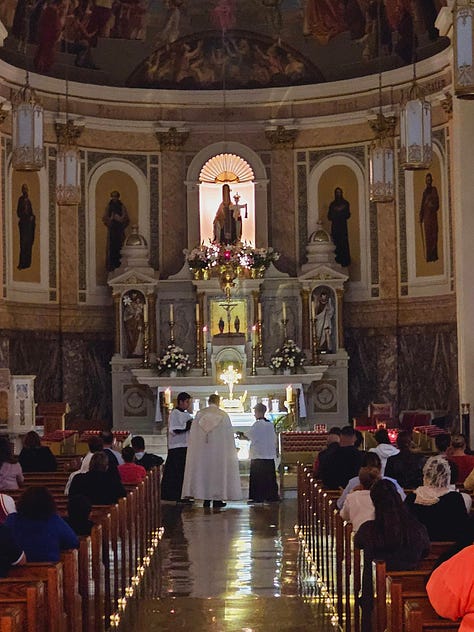

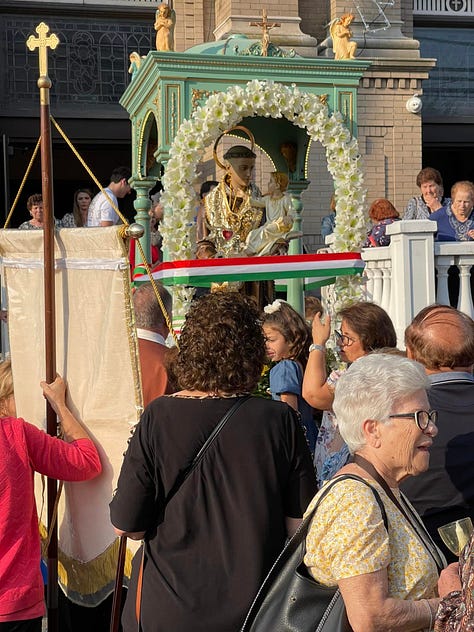

At Mass today, your priest might bless lilies for you to keep. The blessing of lilies, which remind us of St. Anthony's purity and have always been a symbol for him, stems from a miracle which took place in Revolutionary France: many priests and religious were murdered, so many churches and convents destroyed, but the faithful still showed up at a surviving church on the Feast of St. Anthony. Months later, it was discovered that lilies that had adorned the church at that feast were still fresh. Let the lilies beautify your house, or carry them with you, or press them in a book, etc. If your priest doesn't bless lilies, you can still use them non-sacramentally to remind you of one of the greatest Saints ever.2
In some parishes, chapels, or countries, animals might be blessed today as they are also sometimes blessed on the Feasts of St. Anthony Abbot and of St. Francis of Assisi.
Another custom on this day is known as "St. Anthony's Bread" and goes back to A.D. 1263 when a child drowned near the Basilica of St. Anthony in Padua as it was still being built. The mother besought St. Anthony and promised that if her child were restored to life, she would give to the poor an amount of wheat equal to the weight of her child. Of course her son was saved, and her promise was kept. "St. Anthony's Bread," then, is the promise of giving alms in return for a favor asked of God through St. Anthony's intercession (the custom also takes place throughout the year when parents give alms after placing their baby under the patronage of St. Anthony). In some places, the custom has a literal parallel in that loaves of bread might be blessed and given away at church or, generally, to the poor. Such is the case in the town of Gildone, Campobasso, Molise, Italy. There, a great procession is made of the loaves of bread the women make. Large baskets filled with loaves of bread are decorated with flowers and carried by women on their heads. Little children dressed in habits like the one St. Anthony wore follow along.
Ember Friday in Whitsun Week
The Gift of Understanding
The sixth Gift of the Holy Ghost raises the soul to a still higher state. The first five Gifts all tend to action. The Fear of God keeps man in his right place, for it humbles him; Godliness opens his heart to holy affections; Knowledge enables him to discern the path of salvation from that of perdition; Fortitude arms him for the battle; Counsel directs him in his thoughts and works:—thus gifted, he can act, and pursue his journey with the sure hope of coming at length to his heavenly home. But the Holy Ghost has other favors in store for him. He would give him a foretaste, here below, of the happiness that awaits him in the next life: it will give him confidence, it will encourage him, it will reward his efforts. Contemplation,—yes, this is the blissful region thrown open to him, and the Holy Ghost leads him thither by the gift of Understanding.
There will be a feeling of surprise and hesitation arising in the minds of many at hearing this word, Contemplation. They have been taught to look on Contemplation as an element of the spiritual life which is rarely to be hoped for, and almost impossible for persons who are in the ordinary walks of life. We must begin, then, by telling them that such an idea is a great and dangerous error, and one that checks the progress of the soul. No: Contemplation is a state to which, more or less, the soul of every Christian is called. It does not consist in those extraordinary effects which the Holy Ghost occasionally produces in some privileged souls, and by which he would convince the world fo the reality of the supernatural life. It is simply a relation of close intimacy existing between God and a soul that is faithful to him in Action. For such a soul, unless she herself put an obstacle, God reserves two favors: the first is the gift of Understanding, which consists in a supernatural light granted to the mind of man.
This light does not remove the sacred obscurity of Faith; but it enlightens the eye of the soul, strengthens her perception, and widens her view of divine things. It dispels clouds, which were occasioned by the previous weakness and ignorance of the soul. The exquisite beauty of the mysteries is now revealed to her, and the truths which hitherto seemed unconnected, now delight her by the sweetness of their harmony. It is not the face-to-face vision which heaven gives, but it is something incomparably brighter than the feeble glimmer of former days, when all was mist and doubt. The eye of her spirit discovers analogies and reasons, which do something more than please—they bring conviction. The heart opens under the influence of these bright beams, for they feed faith, cherish hope, and give ardor to love. Everything seems new to her. Looking at the past, and comparing it with the present, she wonders within herself how it is that Truth, which is ever the same, has a charm and power over her now which it once had not?
The reading or hearing of the Gospel produces an impression far deeper than formerly: she finds a relish in the words of Jesus which, in times past, she never experienced. She can understand so much better the object of the institution of the Sacraments. The holy Liturgy, with its magnificent ceremonies and sublime formulas, is to her an anticipation of heaven. She loves to read the Lives of the Saints; she can do so, and never feel a temptation to carp at their sentiments or conduct: she prefers their Writings to all others, and she finds in these communications with the friends of God a special increase of her spiritual good. No matter what may be the duties of her station in life, she has, in this glorious Gift, a light which guides her in each of them. The virtues required from her, however varied they may be, are so regulated that one is never done to the detriment of another; she knows the harmony that exists between them all, and she never breaks it. She is as far from scrupulosity as from tepidity, and when she commits a fault, she loses no time in repairing it. Sometimes, the Holy Ghost favors her with an interior speaking which gives her additional light for some special emergency.
The world and its maxims are mere vanities in her estimation; and when necessity obliges her to conform to what is not sinful in either, she does so without setting her heart upon it. Mere natural grandeur or beauty seems unworthy of notice to her whose eye has been opened by the Holy Spirit to the divine and eternal. To her, this outward world, which the carnal minded man loves to his own destruction, has but one fair side:—it is that the visible creation, with the impress of God’s beauty upon it, can be turned to its Maker’s glory. She gives him thanks when she uses it; she elevates it to the supernatural order by praising, as did the Royal Prophet, Him who shadowed the likeness of his own beauty on this world of created things, which men so often abuse to their perdition but which were intended as so many steps to lead us to our God.
The gift of Understanding teaches the Christian a just appreciation of the state of life in which God has placed him. It shows him the wisdom and mercy of those designs of Providence which have, at times, disconcerted his own plans, and led him in a direction the very opposite to his wishes. He sees that had he been left to arrange things according to his own views he would have gone astray; whereas now God has put him in the right place, though the workings of his Fatherly wisdom were at first hidden from him. Yes, he is so happy now! he enjoys such peace of soul! he knows not how sufficiently to thank his God for having brought him where he is without consulting his poor fancies! If such a Christian as this be called upon to give counsel,– if either duty or charity require him to guide others—he may safely be trusted; the gift of Understanding teaches him to see the right thing for others as well as for himself. Not that he ever intrudes his counsel upon others, or makes himself adviser general to all around him; but if his advice be asked, he gives it, and the advice seems a reflex of the inward light that burns within him.
Such is the gift of Understanding. It is the true light of the soul, and it is weaker or stronger according to the measure of her correspondence with the other Gifts. Its safeguards are humility, restraint over the desires of the heart, and interior recollection. Dissipation of mind would dim its brightness, or even wholly put out the light. But where duty imposes occupation—not only busy and frequent, but even distracting—let the Christian discharge them with a pure intention, and his soul will not lose her recollection. Let him be single-hearted, let him be little in his own eyes, and that which God hides from the proud and reveals to the humble, will be manifested to him and abide with him.
If is evident from all this that the gift of Understanding is of immense importance to the salvation and sanctification of the soul. It behooves us, therefore, to beg it of the Holy Ghost with all the earnestness of supplication; for we must not forget that it is obtained rather by the longings of our love than by any efforts of the intellect. True—it is the intellect that receives the light; but it is the heart—the will—inflamed with love, that wins the radiant Gift. Hence that saying of Isaias: Unless ye Believe, ye shall not Understand! (Isaias vii.9, according to the Septuagint, as quoted by several of the Greek and Latin Fathers.) Let us, then, address ourselves to the Holy Spirit in these words of the Psalmist: Open thou our eyes, and we will consider the wondrous things of thy law! Give us understanding and we shall live! Let us beseech him in these words of the Apostle, wherein he is praying for his Ephesians: let us make his prayer our own: “Give us the spirit of wisdom and revelation, whereby we may have the knowledge of our God! Enlighten the eyes of our heart, that we may know what is the hope of our calling, and what the riches of the glorious inheritance prepared for the Saints!”
— Dom Prosper Gueranger, The Liturgical Year
June is dedicated to the Sacred Heart of Jesus
O dearest Jesus, Whose Most Amiable Heart excludes not even the greatest sinners if they turn to Thee, grant, we beseech Thee, to me and all penitent sinners a heart like unto Thine; That is, a humble heart that even in the midst of temporal honors loves a hidden life, a life little esteemed by men; A meek heart that bears with all and seeks to be revenged on no one; A patient heart that is resigned in adversity and happy even in the midst of most trying circumstances; A peaceful heart that is ever at peace with others and with itself; A disinterested heart that is always content with what it has; A heart that loves prayer and prays often and cheerfully; A heart that only desires that God be known, honored and loved by all His creatures; That grieves for nothing except when God is offended, Despises nothing but sin, Wishes for nothing but the Glory of God and its neighbor's salvation; A pure heart that in all things seeks God alone and desires to please Him; A grateful heart that does not forget but duly values the benefits of God; A strong heart that is daunted by no evil but bears all adversity for the love of God; A heart liberal to the poor and compassionate to the suffering souls in Purgatory; A well-ordered heart, whose joys and sorrows, desires and aversions, Nay, whose every motion is regulated according to the Will of God.
~Prayer of St. Clement Mary Hofbauer, C.S.S.R.
https://fisheaters.com/customstimeafterpentecoststa-litany.html
https://fisheaters.com/customstimeafterpentecoststa.html




